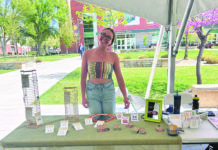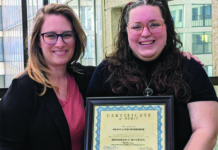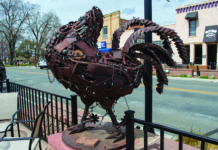by Tyler Fransen
Since fall of 2014, Dr. William “Bill” Flanik has been a professor of political science at Colorado Mesa University. Prior to his arrival at CMU, he spent years in Toronto and Ontario, Canada working towards his PhD. This is his story about gaining knowledge of other cultures and how he’s applied them to his work, and how they relate to this 2016 election cycle.
Have you done any teaching before you came to CMU or is this your first time as a professor?
“I call it my first grown up job. Although it’s funny how graduate programs typically work is you will get so called, ‘teacher assistants’ which we don’t have here at CMU. But so you do a lot of the teaching that way [in Canada] so I have many years of experience doing that. I also trained other teacher assistants in Toronto, so I was sort of like a senior teacher assistant who was passing down the wisdom. And then I had a contract gig just teaching one course at a university in Kitchener Waterloo, Ontario. But apart from that no, this is it this is the dream.”
This is the dream?
“It is the dream and three quarters of faculty now, one statistic I read anyway, three quarters of teachers in higher ed are actually employed on a part time contingent contract basis, so this is a pretty big deal to get a tenure track position, so I’m very happy about that.”
What are some of your favorite subjects to teach as a political science professor?
“It’s funny, a lot of the faculty here are actually pretty multi-disciplinary; so much of the stuff that I do actually falls outside of political science. Political science itself is one of those disciplines that likes to borrow. It borrows from economics, it borrows from psychology, it borrows from sociology, anthropology even to some extent. And so I sort of dabbled a little bit in all of those fields, but in terms of what I do here actually my favorite course is an interdisciplinary ‘peace and conflict studies’ course. And that looks at military studies, gender studies, economics like all kinds of different fields so it’s super cross-disciplinary. And I’ll be doing a milestone on violence next semester as well, and [for that class] I’ll be working with an instructor of English, so we’re totally mixing it up here.”
As someone who’s been trained and has a doctorate in political science, what do you as an expert in this field make of the 2016 not just of the presidential election but the overall tone of this election season?
“Well, I should clarify first, my expertise is mainly not in domestic politics so I don’t look very closely at United States politics. I do look at U.S. foreign policy a lot. So, I do mostly world politics and international security as well as what we call, ‘comparative politics’ which is just looking at foreign countries and sort of comparing them to each other. That said, I’m actually hesitant to go on record with any of my own political opinions, [but] I will say I find Trump fascinating. It’s fascinating from a social sciences standpoint because what he’s managed to do is transcend the Republican party orthodoxy on a number of issues, and trade is the biggest one. So it’s very interesting to see this backlash against global trade because it’s been part of the Republican platform for so long, I mean that’s essentially what they’re founded on, so it’s interesting to have a candidate who’s able to buck that orthodoxy. In terms of his overall demeanor, style, his policy positions, the way he comports himself, he’s able to break a lot of the so called rules of politics. And nothing sticks to him, he’s like sort of teflon in that way. So I think it’s fascinating to have a guy who instead of kissing babies; a crying baby shows up at one of his rallies and he makes a joke about it, but then he says ‘Okay, really you can get that baby out of here.’ You know he’s able to mock war heroes, gold star families, mocking John McCain for getting taken prisoner, I mean it’s fascinating because these are things that you just don’t do in politics I mean you don’t. There are clear boundaries, or at least there used to be in American political discourse and he’s transgressing those. So the big question for me is, ‘why? How is he able to do it?’ And it’s absolutely fascinating.”
Later on in the interview, Dr. Flanik discussed his time in Canada, and what he learned about America from the outside looking in.
You were in Canada as a TA, getting your doctorate, what were some things that you took away from Canada and their political atmosphere and have learned in comparison to the United States?
“I mean I can speak from personal experience, a lot of the cultural issues that inflame American politics here have been more or less subtle there. Canadians don’t have quite the same bitter divisiveness over social issues like abortion for example. Marijuana has been, depending on what province you’re in, has been de facto decriminalized for quite a while, and the new Trudeau government is actually thinking of introducing a bill to legalize it nationally. Oh, and health care is the big one, otherwise America and Canada are very similar, health care is going to be a big difference. I can say I got the best health care of my life for the least amount of money in Canada, each province has a single payer health care system set up.”
Flanik would later go on to say that Canadian and American politics are otherwise similar, apart from the fact that Canadian politics are more boring in comparison. In the last portion of the interview, Dr. Flanik discussed what he most wanted his students to get out of his classes.
“I would actually say, and I’ve felt this way for a long time, content-wise I’m not going to answer this in terms of content, it’s more about attitudes and general orientations. I don’t remember a thing that I learned in undergrad to be honest with you. I mean a few things here and there, but I don’t. And it’s not necessarily because I was partying all the time, it was just because time passes and you have to relearn stuff. So it’s really not that kind of factual content knowledge but it’s more what I did retain is really a certain critical approach to information. So, in other words, I want them to be able to, let me put it this way: a friend posts something on Facebook, a meme, what do you do? Click share. Think about it for a minute, get critical here, what’s the message here, is it correct? Does it have a factual basis? What viewpoints does that represent?”
Dr. Flanik also talked about the international student exchange program and the international studies course and hopes students will learn more about them and from them.
“There is a world outside of Grand Junction although sometimes it’s easy, even for me, to forget, you know? There’s a world out there and I think if you were to spend a semester abroad, you’ll learn more in one semester abroad than you can learn in four years at CMU, so I’d say check it out.”





